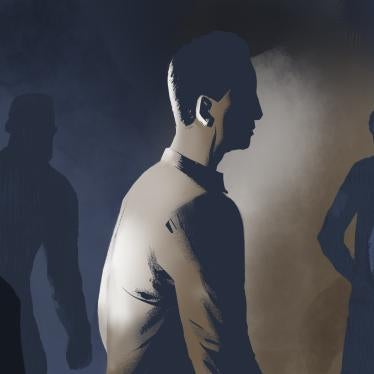A sixteen-year-old boy's prosecution and conviction for engaging in sexual relations with men violates international standards, Human Rights Watch said in a letter to Egyptian authorities released today.
Convicted of "debauchery" on September 18 after police coerced him into giving a confession, the boy received a sentence of three years' imprisonment with labor followed by three years of probation. His appeal, originally set for October 31, will be heard on November 21.
Human Rights Watch called on Egypt's prosecutor general to ask the appeals court to overturn the conviction, citing discriminatory application of the law, charges of torture during interrogation, prolonged pretrial detention, limited access to counsel and family members, and a failure to protect the boy's privacy during the court proceedings.
"This case has been marred by a host of human rights violations," said Clarisa Bencomo of the Children's Rights Division of Human Rights Watch. "It should never have come to trial."
The youth has said that police extracted a confession from him after subjecting him to painful beating on the soles of the feet. He did not have access to a lawyer during his interrogation, and he was not allowed to contact his family during the first two weeks of his detention. Press and spectators were allowed to attend and report on the September and October hearings, and the boy's name, photo, and accounts of the charges and sentence have appeared in Egypt's semi-official press.
The boy was one of fifty-six people detained and charged with similar offenses after a crackdown in May against men presumed to be gay. The others, all adults, were prosecuted separately before an Emergency State Security Court, which reached a verdict on November 14. Twenty-three were sentenced to between one and five years of hard labor; twenty-nine were acquitted.
Last week, Egyptian authorities made four additional arrests of men presumed to be gay, according to reports in the Egyptian press.
Egypt does not expressly outlaw homosexual acts. Instead, authorities initially accused the boy of "abuse of religion" (istighlal al din). Interrogated before he was allowed to contact a lawyer, the boy denied the initial accusation but admitted to engaging in sexual acts with men, leading prosecutors to charge him with debauchery (mumarasat al fujur). Three years' imprisonment followed by a similar period of probation is the maximum sentence that can be imposed under this provision, contained in Law No. 10 of 1961 on the Combat of Prostitution.
"Egyptian authorities targeted these individuals solely because of their presumed sexual orientation," Bencomo said. "By discriminating against a group of its citizens in this way, Egypt has violated a fundamental principle of human rights law."
In addition, criminalization is not an appropriate response to sexual activity on the part of a child, Human Rights Watch argued. International law does not permit the criminalization of sexual relations between consenting adults of the same sex; a child should not be held criminally responsible for an act that would not, under these standards, be subject to criminal responsibility if committed by an adult.
The arrests and convictions also take place in a climate of serious erosion of basic civil rights for Egyptian citizens. The country has been under continuous emergency rule since October 1981, following the assassination of Anwar Sadat. Following a resurgence of political violence in the early 1990s, the government introduced antiterror laws that gave the security and intelligence services greater powers of arrest and detention, enabling them to round up thousands of suspects.







